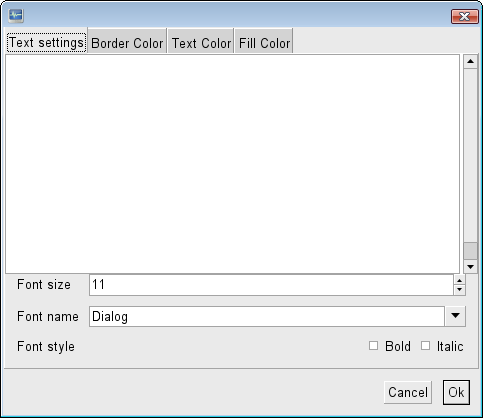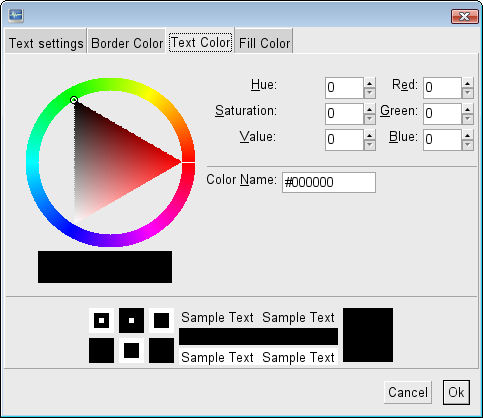Please note that the recommended version of Scilab is 2026.0.1. This page might be outdated.
See the recommended documentation of this function
TEXT_f
Free annotation
Block Screenshot

Palette
Description
This special block is only used to add text at any point of the diagram window. It has no effect on the simulation.
You can add this block directly by a mouse double click in a free part of the diagram.
After addition, double click on the block and write your text. If you want more control on the text (font type, size or colors), a mouse right click shows a pop-up menu. Select the sub-menu item Edit... of the Format menu item. This item open the tabbed dialog below where you can set the text parameters.
Note : the following GUI is also used to modify comment text and appearance of the blocks and links.
Dialog box


Text tab
In this tab, you can modify your text and its appearance with the font size, family and style. You can also use some HTML tags to control you text displaying. Starting from Scilab 5.2, it is also possible to write LaTeX or MathML expressions.
Colors tabs
The use of these tabs is the same for the text, border or fill colors. You can set the color with four methods :
HSV colors (hue, saturation, value).
RGB colors (red, green, blue).
HTML color : color in the form of a string of three hexadecimal numbers with two digits (RRGGBB) preceded by the character "#".
HSV color wheel : move the little white segment around the circle to set hue, and move the little circle to set the saturation and value.
Default properties
always active: no
direct-feedthrough: no
zero-crossing: no
mode: no
number/sizes of activation inputs: 0
number/sizes of activation outputs: 0
continuous-time state: no
discrete-time state: no
object discrete-time state: no
name of computational function: text
Example
The figure below shows some examples of text annotations. The first shows the result obtained with a LaTeX expression, the second the text is an ordered HTML list. Open this example in Xcos and select Format then Edit... in the pop-up menu to change the text parameters.

See also
- Math rendering — Display mathematical equations in Scilab graphics through the LaTeX or MathML languages.
Authors
Ramine Nikoukhah - INRIA
| << Annotations_pal | Annotations palette | Commonly used blocks palette >> |